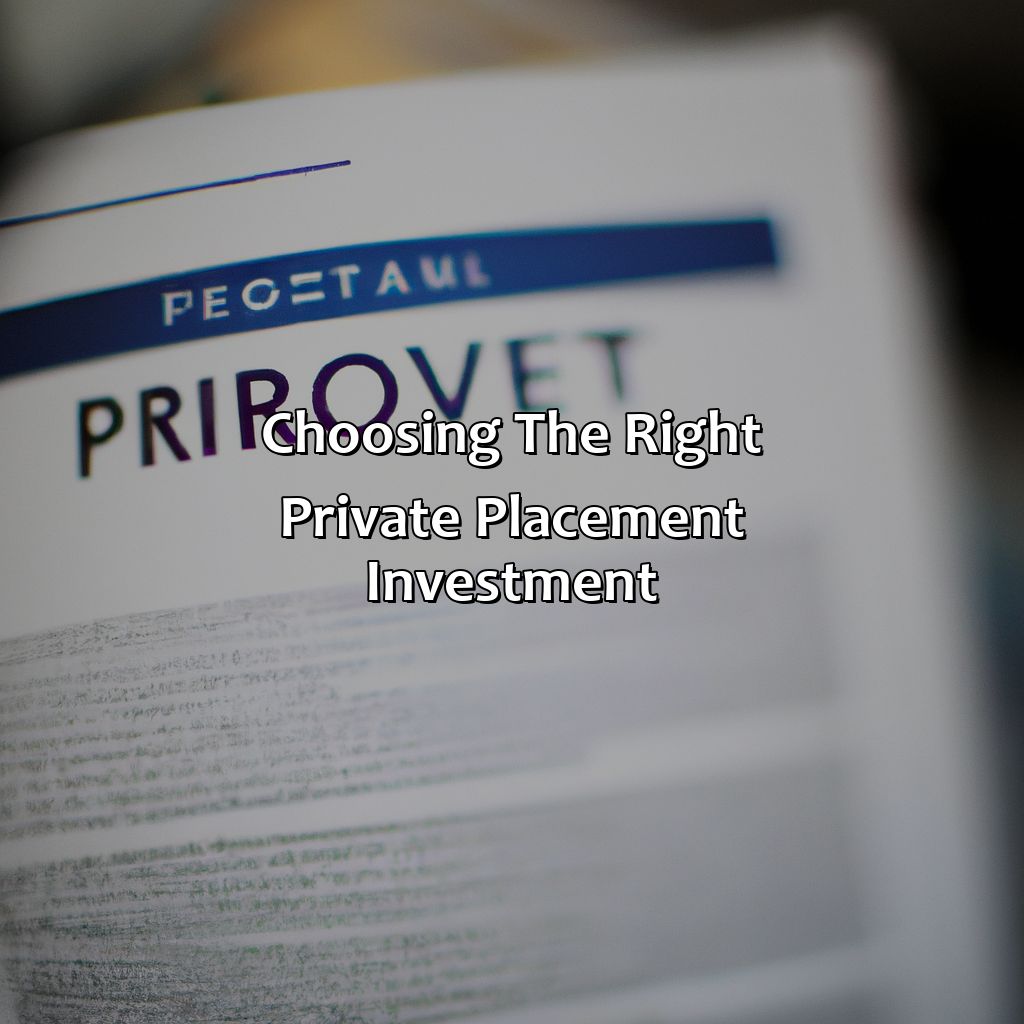What Is A Private Placement Investment?
Key Takeaway:
- Private placement investments are a type of investment where securities are sold to a select group of investors, rather than to the public. These investments are typically used by companies that are looking for funding for their business activities, but do not want to go through the costly and time-consuming process of a public offering.
- There are regulations governing private placement investments that aim to protect investors from fraud and ensure that they are financially capable of investing in these types of securities.
- The benefits of private placement investments include the ability for companies to raise capital quickly and efficiently, without the need for the extensive reporting and disclosure requirements that come with public offerings. Additionally, investors can potentially receive higher returns on their investments due to the limited number of investors and the exclusivity of the investment opportunity.
Are you considering investing in private placements but don’t know what they are? Discover the basics of private placement investments and decide if it is the right move for you. You will learn the key features and benefits of this type of investment.
Private Placement Investments: An Overview
Private Placement Investments: A Professional Overview
Private Placement Investments refer to securities sold through a non-public offering and are typically offered to accredited investors. They include different types of securities such as equity, debt, or convertible securities. These investments follow different regulations than public offerings and are not registered with the SEC.
When compared to public offerings, private placements allow for more flexibility in pricing, structure, and timing. Additionally, private placements provide a level of confidentiality and allow for a more focused approach to fundraising.
It’s important to note that not all investors are eligible for private placement investments, as they are typically limited to accredited investors. Accredited investors have a higher net worth and income level, as well as a level of investment experience and knowledge.
Private Placement Investments provide a unique opportunity for eligible investors to diversify their portfolios and potentially earn higher returns. However, it is crucial to thoroughly research and understand the risks and potential rewards involved before investing.
Considering the potential benefits and limitations, it is essential to explore Private Placement Investments as an alternative to public offerings. Don’t lose the chance to diversify your portfolio and potentially earn higher returns by not exploring this opportunity.

Image credits: retiregenz.com by Adam Woodhock
Understanding Private Placement Investments
Maximise your knowledge of private placement investments! Explore this interesting section for details. It covers different parts of private placement investments such as what they are, the rules that apply, and the advantages.

Image credits: retiregenz.com by Adam Duncun
Definition of Private Placement Investments
Private Placement Investments refer to an investment opportunity that involves private sales of securities to pre-selected investors, rather than on a public stock exchange. Such investments are typically offered to sophisticated investors and institutional buyers who possess the financial capability and expertise needed to invest in such securities. For companies, private placement investments allow them to raise funds without going through the extensive regulatory requirements associated with public offerings.
These types of investments can take many forms, including stocks, bonds, limited partnerships and more. The issuers or companies who offer these investments do not need to register with a regulatory body like the Securities and Exchange Commission (SEC) as their private status exempts them from such requirements. Investors’ access to important information related to these investments may also be limited compared with public offerings.
It is essential for potential investors in private placement investments to conduct thorough due diligence before committing funds as it comes with some level of risk. These investments are usually illiquid and have longer holding periods compared with publicly-traded stocks or bonds. However, Private Placement Investments can offer higher returns compared with traditional investment opportunities.
In recent times, private placement markets have become more popular as companies seek out alternative fundraising options outside of traditional IPOs. This growing interest has been facilitated by advancements in technology that have democratized these markets by providing smaller or individual retail investors access previously unavailable and providing visibility into such transactions across various platforms and exchanges.
Regulations and private placement investments – because sometimes it takes more paperwork to invest in a company than it does to start one.
Regulations Governing Private Placement Investments
Private placement investments are regulated by various laws and regulations that govern the process. These regulations govern how companies raise capital through non-public offerings of securities. The rules stipulate that certain conditions must be met for these investments to take place, including limits on the number of investors and their qualifications.
The Securities and Exchange Commission (SEC) has specific regulations governing private placements investments that issuers must comply with. These guidelines ensure transparency and fairness to investors by requiring detailed disclosures about risks, financial statements, and other material information.
It is important to note that private placement investments are subject to different regulatory requirements than public offerings. Private placements involve fewer investors, less regulatory scrutiny, and less public disclosure.
Private placement investments have become more popular as an alternative to traditional fundraising methods like bank loans or public stock offerings. However, potential investors should thoroughly research the issuer’s business plan, financial statements, and any other available information before making any investment decisions.
According to a recent report by Preqin, private equity funds raised $676 billion in 2020 globally despite the pandemic’s disruption.
Private placement investments: Because sometimes it’s better to be exclusive than inclusive.
Benefits of Private Placement Investments
Private Placement Investments offer various advantages that traditional investments do not provide. These investments enable specific investors to invest their money in non-publicly traded securities. This creates unique benefits that are not available to most investors.
- High Returns: Private Placement Investments typically yield higher returns than stocks and bonds.
- Less Liquidity Risk: They do not trade on publicly accessible markets reducing the risk of liquidity caused by a market sell-off
- Lower Taxes: Private Placements provide tax savings opportunities for many high-net-worth individuals.
- Diversity: Investing in a range of private placements reduces risks from individual company failures.
- Flexibility: Private placements allow executives and wealthy investors to avoid regulations that apply to public offerings, giving more flexibility.
Notably, private placement investments give access to exclusive investment opportunities and the chance to build longer-term relationships with exciting startups.
Pro Tip: It is crucial to consult financial advisors before investing in private placements. An investor should understand various types of private placements, due diligence requirements, restrictions involved and drawbacks if any.
Get ready to invest in private placements- it’s like playing a game of mystery box, but with potential profits instead of jump scares.
Types of Private Placement Investments
Wanna know about private placement investments? Equity-based and debt-based private placement investments are solutions. Get access to unique investment opportunities not available to the public. Diversify your portfolio with these types of investments.

Image credits: retiregenz.com by Harry Jones
Equity-Based Private Placement Investments
Investments that involve purchasing equity shares in a privately held company are called Equity-Based Private Placements. These investments offer opportunities for investors to invest in companies that are not publicly traded on stock exchanges. Private Placement markets offer flexible investment terms to accommodate both small and large-scale investments, with the primary focus being accredited investors who are sophisticated in making high-risk investments.
Additionally, these investments give investors partial ownership of the company, providing them with higher returns when the company becomes successful.
Equity-Based Private Placement Investments help companies raise capital which they can use to fund business expansion or research and development projects. In return, an investor receives a share of profits generated by the company. Most often, these investments require investors to hold their position for an extended period, typically between three to seven years before exiting from the investment.
It is worth noting that Equity-Based Private Placements have several advantages over other forms of investments like public equity markets. For instance, private placement investors benefit from significant cost savings since they avoid publicity costs required in public offerings. By investing in an enticing firm at its early stage of development, they gain better equity valuation opportunities than pre-IPO stocks offered by public markets.
According to Investopedia surveys conducted on private placement deals globally, tech businesses raised more through private placements than any other sector. Furthermore, the survey revealed that 65% of deals were led by independent brokers or financial consultants rather than traditional banks’ intermediation services.
Debt-based private placement investments: because keeping up with your mortgage payments just isn’t thrilling enough.
Debt-Based Private Placement Investments
Investments made privately and based on loans or debts are a type of private placement investment. These investments usually involve the sale of debt securities to accredited investors, bypassing the traditional public markets. These types of investments typically provide a fixed income stream with a predetermined payment schedule.
Debt-based private placement investments offer a range of advantages over traditional borrowing methods. They allow investors access to capital at more competitive rates than standard bank loans while providing borrowers with more flexible terms. Unlike publicly traded debt securities, these investments can be tailored to meet specific investor requirements and needs.
It is important to note that the risks associated with debt-based private placement investments can vary widely depending on the security’s underlying assets. High-yield private placements tend to have higher default rates and carry greater risks than those with lower returns. As such, it is crucial for investors to conduct extensive due diligence before investing in any debt-based private placement.
In recent years, there has been an increase in demand for debt-based private placement investments as they offer investors an alternative source of consistent returns in volatile markets. This growing popularity can be attributed to an increase in regulatory oversight leading to better market transparency and investor awareness.
Overall, debt-based private placement investments provide opportunities for both borrowers and investors alike. They allow businesses access to competitive financing without compromising their capital structure while offering investors reliable returns on their investment portfolios.
Choosing the right private placement investment is like a game of Russian Roulette, except instead of bullets, you’re dodging financial mistakes.
Choosing the Right Private Placement Investment
Choosing the Appropriate Private Placement Investment
When considering a private placement investment, it is imperative to choose the right one to ensure long-term profitability. Perform thorough research on the investment opportunity, such as reviewing the issuer’s financial situation, assessing the risks and rewards, and ensuring that the investment aligns with your investment goals and risk tolerance.
When assessing the issuer’s financial situation, review their financial statements, including income statements, balance sheets, and cash flow statements. Ensure that the financials are audited by a reputable accounting firm. Examine the issuer’s market position, competitive advantages, and industry trends to determine if the issuer has the potential for long-term growth.
Assess the potential risks and rewards of the investment by reviewing the issuer’s business plan and checking whether they have a well-defined strategy for growth. Study the terms and conditions of the private placement to ensure that the investment aligns with your investment goals, and only proceed with investments that align with your risk tolerance.
A famous example of a private placement is when Facebook issued private shares to Goldman Sachs and other strategic investors, which provided them with early access to the company’s IPO. This investment provided the investors with significant returns, but it is crucial to remember that the success of a private placement investment varies case-by-case.

Image credits: retiregenz.com by Joel Arnold
Risks Associated with Private Placement Investments
Private Placement Investments: The Dangers Involved
Investors search for exclusive opportunities that promise higher returns, and private placement investments can serve that purpose. Nevertheless, these investments are not for everyone, and they come with substantial risks.
In the case of Private Placement Investments: The Dangers Involved, there is no guarantee that investors will receive their payments. The lack of liquidity makes it hard to sell one’s security. Moreover, the lack of regulatory oversight increases the chances of fraudulent activities by the company issuing the security. Often, investors end up losing some or all of their investments.
Lastly, private placements are not very well known, which can make them confusing for investors. It is important to weigh the potential risk and return tradeoff against more conventional investments—such as stocks or bonds—before deciding to invest.
Don’t miss out on promising opportunities due to a lack of knowledge or understanding. Stay informed by conducting thorough research from reliable sources, and seek the advice of a reputable financial professional. Remember, by investing wisely, you are increasing your chances of success.

Image credits: retiregenz.com by James Woodhock
Some Facts About Private Placement Investments:
A private placement investment is a capital raising strategy from a select group of investors, typically institutional investors, high-net-worth individuals, or private equity funds. (Source: Investopedia)
Private placement investments are exempt from registration with the Securities and Exchange Commission (SEC), but may still be subject to state regulations. (Source: SEC)
Private placement investments can offer higher returns than traditional investment vehicles, but are considered higher-risk. (Source: Forbes)
Private placement investments can be structured in various forms, ranging from equity to debt securities, and can be used for financing startups, real estate projects, or existing businesses. (Source: Wall Street Journal)
Private placement investments are usually not publicly traded and have limited liquidity, meaning it may take a long time to sell or exit the investment. (Source: Nasdaq)
FAQs about What Is A Private Placement Investment?
What is a private placement investment?
A private placement investment is a type of investment in which private companies offer securities to a small group of accredited investors, in an effort to raise capital.
What are the advantages of a private placement investment?
Private placement investments offer a number of advantages over traditional investments, including less regulatory oversight, more flexibility in terms of investment terms, and potentially higher returns.
Who can invest in private placement opportunities?
To invest in private placement opportunities, an investor must be an accredited investor, as defined by the Securities and Exchange Commission (SEC). This means they must have a net worth of at least $1 million or an annual income of at least $200,000 for the past two years.
What types of securities are typically offered in private placement investments?
Private placement investments can include a wide variety of securities, including stocks, bonds, and other debt securities, as well as options and warrants.
How do private placements differ from traditional IPOs?
Private placements are typically conducted outside of public markets, and involve a smaller group of investors. IPOs, on the other hand, are open to the public and involve much larger offerings.
What should investors consider before investing in a private placement?
Investors should carefully consider the risks and potential rewards of any private placement investment before investing. They should also conduct due diligence on the company offering the securities, and consult with financial and legal professionals to ensure they understand the terms of the investment.
 Checkout this IRS Loophole
Checkout this IRS Loophole 
